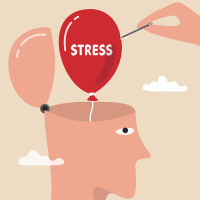What is Stress
In everyday life, the word “stress” is often used to describe the intense, overwhelmed feeling one experiences in reaction to pressure or demands. This physiological response, termed the “fight or flight” reaction by scientists, prepares your body to either fight the source of danger or escape from it. Typically, stress induces an elevated heart rate, heavy breathing, muscle tension, sweating, and increased alertness.
However, not all stress is bad. In reasonable doses, it can motivate individuals to perform under pressure and meet important deadlines because it helps you stay focused, energetic, and alert. It is when stress becomes unmanageable or constant, leading to emotional, cognitive, and physical health issues, that it becomes a cause for concern. The immune, cardiovascular, neuroendocrine, and central nervous systems, among others, are severely impacted by prolonged stress and can lead to a multitude of health complications.
Get Moving to Relieve Stress
Exercise plays a pivotal role in reducing stress and bolstering well-being. Amid the whirlwind of daily life, it seems challenging to squeeze in a workout, but it’s crucial for a healthy body and mind. The beauty of physical activity is that it’s an effective yet under-utilized stress-relief tool, which has myriad benefits beyond a toned body or muscular strength. When we ‘get moving,’ our body releases endorphins, known as ‘feel good’ hormones, these interact with the brain to reduce perceived pain and trigger a positive feeling.
By incorporating routine exercises into your daily regimen, one can significantly mitigate stress levels. Living in the digital era, a plethora of online platforms offer free guides to various types of workouts, ranging from brisk morning walks to heavy training sessions. Even a brief engagement in physical activity can serve as an excellent distraction, breaking the relentless cycle of worries feeding your stress. So in the face of rising tension or mental exhaustion, remember to get up, strap on those runners and ‘get moving’. Your body and mind will thank you.
Nourish Your Body for Well-Being
A healthy intake of balanced nutrition plays an indispensable role in safeguarding one’s well-being, which subsequently helps in reducing stress levels effectively. Nutrition facilitates a healthy physical state, provides energy, optimizes bodily functions, and enhances the immune system. Consuming foods rich in vitamins, minerals, and antioxidants, such as fruits, vegetables, lean meats, and whole grains, can significantly improve mental clarity. Furthermore, staying hydrated is essential for maintaining overall body balance.
On the other hand, high consumption of processed foods, excessive caffeine or alcohol, and sugary snacks can increase feeling of anxiousness and lead to unhealthy stress levels. A proper, nutritious diet has a direct effect on our mental health, playing integral roles in modulating mood and behavior. Eating right is not only a matter of physical health, but also of mental and emotional well-being, acting as a significant pillar in stress management. Properly nourishing the body provides the energy and resilience to tackle stress more effectively, leading to an improved quality of life.
Calm Your Mind through Meditation
Meditation, an age-old practice, is not just about inner peace, but also about training the mind to acknowledge thoughts without self-judgment. The key is to be in the present, focusing on your breath, dismissing any rogue thoughts that try to steal your concentration. Resultantly, this powerful tool aids in reducing anxiety, lowering stress levels and enhancing emotional health.
Using techniques such as mindfulness meditation, you can learn to happily tune out the noise of the world and find your own peaceful sanctuary. With consistent practice, you can improve your ability to remain calm and focused in the midst of life’s storms. As your mind learns to navigate through the chaos of thoughts and emotions, you may find yourself responding more patiently and thoughtfully to stress, rather than reacting impulsively.
Laughter as a Stress Reliever
Often undervalued as a therapeutic tool, laughter is not only contagiously joyful but also holds incredible power in counteracting the body’s stress response. By stimulating circulation and aiding muscle relaxation, laughter can reduce some physical symptoms of stress. Furthermore, natural morphine-like chemicals called endorphins released by the brain during laughter can also help minimize feelings of pain and discomfort, lending strength to the age-old saying, “Laughter is the best medicine.”
When we share in laughter, an essential social bonding experience is fostered, which can help improve mood, enhance cognitive function, and promote general wellness. Moreover, with laughter’s ability to increase personal satisfaction and optimism, it can help us perceive otherwise stressful situations from a more relaxed perspective. Notably, even the simple act of smiling can trigger neural messaging that benefits health and happiness by reducing physical and emotional stress, making laughter, indeed, a formidable stress reliever.
Connect Socially for Support
Deepening our social connections is a potent tool for stress relief. When we form strong relationships with others, we create a buffer against the negative impacts of stress. Engaging in social activities can instantly lift our spirits and put our minds at ease, allowing us to feel more content and relaxed. What’s more, when we are with others, we communicate and express our thoughts and feelings, which is a wonderful way of releasing pent-up emotions that may be contributing to our stress levels.
In terms of social support, it doesn’t need to be an overly elaborate affair. It can be as simple as catching up over a cup of coffee, enjoying a group activity, or even having a quick chat over the phone. This not only provides an opportunity for enjoyment but also the chance to discuss worries or concerns with others. People with strong social support are more resilient against stress, and this ring of connection provides a safety net of sorts, helping them navigate through tough times. This reaffirms the adage, no man is an island. We need others to thrive and ward off the harmful effects of stress.
Establish Healthy Boundaries
Creating a sense of your own space can play a pivotal role in mitigating stress. This involves clearly defining your mental, emotional and physical boundaries. These boundaries help in preventing the unnecessary burden, ensuring your safety and maintaining your peace of mind. They function like a filtering mechanism by limiting the impact of negative interactions and volatile situations, thereby saving you from undue stress.
Perhaps one of the most essential factors in establishing these healthy boundaries is learning to say ‘no’. This means not overcommitting yourself, recognizing your limits and not allowing others to impinge on your personal space or time. Furthermore, it also signifies respecting the boundaries of others, which results in a balanced and fulfilling interpersonal relationship, consequently leading to a stress-free lifestyle.
Yoga for Physical and Mental Harmony
The practice of yoga traces its roots back thousands of years, revered as an ancient healing system that fosters physical well-being and mental peace. It entails an intricate blend of postures (asanas), breathing techniques (pranayama), and meditation that work in harmony to relieve tension, boost flexibility and initiate a tranquil state of mind. Yoga is unique as it integrates the facets of physical fitness with mindful focus, thus acting as an effective tool to reduce stress and anxiety.
Incorporating the routine of yoga can benefit not only your body but also your mind, by fostering a deep sense of connection between the two. As you stretch, balance and hold the yoga poses, you simultaneously create an awareness of your body’s strengths and limitations. Your mind, in turn, learns to release the worries and thoughts which often underlie stress, directing its focus to the present moment instead. Regular, consistent practice can usher in a profound sense of balance within, a state of physical and mental harmony essential in the pursuit of stress-free living.
Prioritize Quality Sleep
Quality restorative sleep lies at the core of stress management. It is during this time of active rest that our minds and bodies restore, recharge and heal. However, stress can often lead to insomnia, feeding into a vicious cycle that leaves us tired and even more stressed. It becomes a priority, therefore, to establish healthy sleep habits and patterns that promote optimal sleep quality.
Strategies such as maintaining regular sleep and waking times, creating a comfortable sleep environment, and avoiding overstimulation close to bedtime all contribute to improved sleep. Other practices such as limiting caffeine intake and disconnecting from digital devices an hour before bed help in reducing wakefulness and encouraging a night of refreshing, uninterrupted sleep. By prioritizing these habits, we equip our bodies to better cope with daily stressors and challenges. These practices not only improve our physical health but have positive impacts on our mental well-being.
Journaling for Emotional Release
In the midst of stressful situations, our emotions can become overwhelming, jumbled, and difficult to understand. This is where journaling can serve as an effective tool for emotional release. Documenting your thoughts and feelings onto paper can provide a clear visual of your mental state, offering perspective on the emotions you’re experiencing. Moreover, it serves as a haven for candid self-expression, enabling you to channel stress without judgment or restrictions.
By converting thoughts into words, journaling can facilitate the processing of those emotions that may otherwise stay suppressed. Often noted as a form of self-care, it attributes to the reduction of stress and anxiety levels. It helps in developing positive coping mechanisms, enables you to track stress patterns, triggers, and ways to mitigate them. Not to mention, the simple act of writing can be therapeutic and can boost your emotional well-being. This process aids in detecting and addressing the root causes of stress, thereby encouraging resilience and promoting mental tranquility.
Music and Creative Outlets
Engaging in creative outlets provides a powerful method for reducing stress. Artistic activities, such as painting or writing, can facilitate self-expression and offer a respite from everyday worries. They provide a mental break, allowing the mind to focus and divert its attention from stressors. Furthermore, these outlets can tap into our inherent sense of joy and childlike wonder, igniting a playful, fun energy often lost in the rigors of adult life.
Music, in particular, has a profound impact on our mood and emotions. The beauty of this medium is its limitless diversity, encompassing countless genres, rhythms, and melodies. Whether it’s playing a musical instrument, singing, or simply listening to your favorite tunes, music can soothe the mind and rejuvenate the spirit. By stimulating our brainwaves, music can lower cortisol levels, the primary stress hormone, thereby promoting relaxation and a sense of well-being. Music and creative outlets are an essential part of a holistic approach to stress management.
Consider Professional Support
While navigating stressful situations, it can be highly beneficial to seek professional support. Therapists and counselors equipped with professional expertise can impart useful strategies for managing stress and coping with its effects. One-on-one sessions with these professionals offer a safe space to share personal experiences, explore feelings and reactions, and gain insights that can ultimately lead to more effective stress management. They can provide a clear view of situations, guiding one through impasses and, in some scenarios, helping to identify stress triggers.
Psychiatrists and psychologists are not the only types of professional support available for stress management. Health coaches and life coaches offer guidance and motivation for lifestyle and behavioral changes that contribute to reduced stress and improved well-being. Moreover, wellness facilities and retreats provide immersive programs, including group therapy, yoga, meditation, and other activities scientifically proven to alleviate stress. Opting for professional support in managing stress can pave the way to a healthier, happier life.
Benefits of Reducing Stress
Reducing stress levels can bring about significant improvements to both physical and mental health. It is observed that lower stress levels contribute to reduced risk of chronic illnesses like heart disease, stroke, and high blood pressure. Stress management also aids in the improvement of the immune system functionality. A strong immune system makes the body less susceptible to infections and speeds up recovery from illnesses or injuries. Moreover, reduced stress can alleviate common issues such as headaches, stomach problems, and muscle pains.
On a psychological level, reducing stress leads to improvements in mood, productivity, and overall quality of life. Less stressed individuals are likely to exhibit higher levels of happiness, enthusiasm, and positivity. Stress reduction also enhances cognitive abilities, leading to better problem-solving skills, improved memory, and greater clarity of thoughts. Moreover, it helps foster healthier relationships as lowered stress levels translate into calmer reactions, better communication, and increased empathy towards others.























